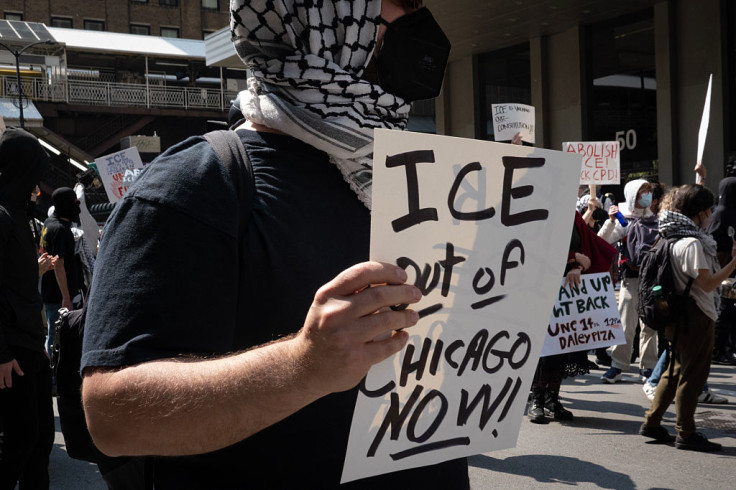
The Department of Homeland Security has initiated a sweeping immigration enforcement campaign in Chicago. Dubbed "Operation Midway Blitz," the effort arrives just days after a Supreme Court ruling gave ICE agents broader authority to operate in Los Angeles. Lawmakers, immigrant advocates, and city leaders are already warning that this marks a new era of federal intervention in so-called sanctuary jurisdictions.
According to DHS, "Operation Midway Blitz" is being conducted "in honor" of 20-year-old Katie Abraham, a University of Illinois student who died in a January drunk-driving incident. The accused driver, Julio Cucul-Bol, is an undocumented immigrant from Guatemala. Assistant Secretary Tricia McLaughlin framed the operation's purpose bluntly: "No city is a safe haven for criminal illegal aliens. If you come to our country illegally and break our laws, we will hunt you down, arrest you, deport you, and you will never return."
Chicago residents and public officials expressed surprise at the announcement. Mayor Brandon Johnson said the city received no advance notice. Governor JB Pritzker called the move "a fear-based tactic that has more to do with politics than with safety."
"Operation Midway Blitz" began over the weekend. According to immigrant advocates, at least five community members were detained, including a well-known flower vendor and several people who were simply waiting at a bus stop. Witnesses also reported a surge of ICE vehicles in heavily Latino neighborhoods, where residents said the presence of federal agents spread fear.
CHICAGO: a sanctuary city that attracts and protects criminal illegal aliens to the detriment of law-abiding citizens.
— U.S. Immigration and Customs Enforcement (@ICEgov) September 8, 2025
In an ICE-led operation, we are here to remove these dangerous public safety threats from American communities. pic.twitter.com/p8G2XFYM18
The backdrop to the operation is Chicago's large immigrant population. The city is home to more than 820,000 Latinos, making up nearly one-third of its residents. Research from the Pew Research Center estimates that Illinois has around 400,000 undocumented immigrants, many concentrated in Chicago and its surrounding suburbs. These communities are deeply integrated into the city's economy, workforce, and cultural identity, making them particularly sensitive to federal enforcement campaigns.
Rey Wences, senior director of deportation defense for the Illinois Coalition for Immigrant and Refugee Rights, described the mood in neighborhoods where arrests were reported. "We believe this marks the beginning of ICE's full escalation in Chicago and Illinois. Families are terrified, children are afraid their parents may not come home, and businesses are seeing fewer customers because people are staying indoors," Wences said.
The escalation in Chicago follows the Supreme Court's controversial ruling last week that lifted restrictions on ICE stops in Los Angeles. That decision expanded the agency's power to detain individuals based on appearance, language, or other broad factors. Civil rights groups argued that the court had effectively legalized racial profiling, and immigrant advocates feared the ruling would quickly ripple across other cities. Chicago now appears to be the next test case.
Trump vs. Chicago
President Trump has long targeted Chicago in his rhetoric, repeatedly describing it as a city "overrun by crime" and "a national disgrace." During his first term, he threatened to "send in the feds" if city officials did not crack down on violence. In his second term, he has returned to that language, warning that he is prepared to use federal forces in Chicago just as he authorized militarized responses in Washington, D.C. during the 2020 racial justice protests. Over the weekend, Trump doubled down on social media, sharing an image of himself as a character from Apocalypse Now with the words "I love the smell of deportations in the morning."
Democratic leaders in Illinois challenged the administration's framing. Senator Dick Durbin said the operation was "a wasteful distraction that punishes hardworking immigrants who have no criminal record." Mayor Johnson added that "this campaign will undermine trust between immigrant neighborhoods and law enforcement at a time when we need cooperation to keep all communities safe."
Research contradicts the administration's repeated claims that immigrants drive crime. A study from the National Bureau of Economic Research found that immigrants were 60 percent less likely to be incarcerated than U.S.-born residents in 2020. Another study based on Texas Department of Public Safety data found significantly lower felony arrest rates among undocumented immigrants compared with both legal immigrants and U.S. citizens.
Despite those findings, DHS insists that "Operation Midway Blitz" targets "the worst of the worst." Yet in its early days, the operation appears to have swept up community members with no serious criminal history. That discrepancy has heightened fears among Latino families that they will be caught up in raids simply for being present in public spaces.
As protests begin to emerge across Chicago, immigrant rights groups are mobilizing to provide legal aid and information hotlines. Faith leaders are also calling for calm and offering safe spaces in churches. "This is about human dignity," said Father José Alvarez, a Chicago priest whose parish includes many undocumented families. "People who have lived here for decades, raised children here, and built lives here deserve compassion, not persecution."
© 2025 Latin Times. All rights reserved. Do not reproduce without permission.








